Christmas is a time full of happiness, love and being with others. This is true wherever you are in the world. This year, I was fortunate enough to experience Christmas in Spain first-hand with my host family.
Celebrating Christmas with people from another culture is even more exciting, as it gives us the opportunity to share our different traditions with each other. I learnt a lot about Spanish festivities over the festive season. We made the most out of it and spent a large part of the holidays laughing and having fun.

Run Up to Christmas
In the lead up to Christmas, the streets were bursting with light and the school corridors were full of Christmas decorations. In the classroom, students were buzzing with excitement in anticipation of the weeks ahead.
So, classroom activities began to build upon this excitement, with students creating Christmas cards and classroom decorations. They also wrote a letter of things they would love to receive at Christmas, ready to hand over to the ambassador. In Spain, it’s not just Santa Claus who commonly brings presents. Instead, it is the Three Wise Kings.
In the same way that Santa has elves, the Kings have an ambassador who visits the children at school on the last day of term. He takes their letters away to the Kings, all in a magical display at the school, filled with bright colours and wonderful costumes. At home, the festivities begin too as the house was fully decked with Christmas items.
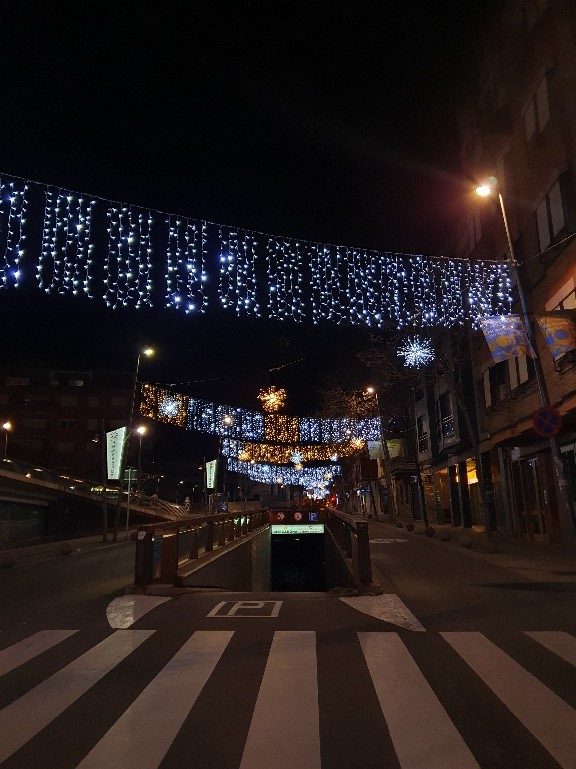
24th December – The Tió
Particularly intrinsic to the northeast of Spain, there is an extra festive tradition that begins in December – the Tió.
In the first weeks of December, each family searches for their Tió in the nearby forest. Rumour has it this is where he lives all year round until each family is ready to welcome him in their home.
The Tió is a large log with painted eyes and a mouth (and a silly tongue sticking out too if you’re lucky). At home, he is covered in a nice warm blanket and ‘barretina’, a traditional Catalan hat. Every night, the family must feed him food. Our Tió really enjoyed fresh oranges, and, in the morning, he always left the peel as proof that he enjoyed the meal.
The hope is that you feed him well during the month so that on the 24th December, you can hit him with a stick and cause him to poop! Luckily, not just any old poop. He poops presents! There is a typical song that the children sing while they hit him with a stick. This crazy tradition was great fun to experience, completely unlike any British traditions!

25th December – Santa Claus
In England, I’ve never had the Tió leave me presents. It’s always been Santa Claus! However, it isn’t very typical that he visits Spanish children on Christmas Eve. So, I taught my host family about him, what he does and how to convince him to visit us this year.
We wanted to bake a traditional English treat, though it proved very difficult to find mincemeat in Spain. So, we settled with another English sweet treat –flapjacks-, using the recipe as a great way to practice our English.
On Christmas Eve, we let him a flapjack, some milk and made sure to leave some make-do stockings on the staircase (which were in fact large ski-socks). The next morning, the children were delighted that he had visited us all. He had left an array of English-themed gifts, including books and chocolate coins (in pounds instead of euros!).
26th December – Boxing Day and Sant Esteve
Boxing Day has always been a heavily celebrated day for me. Across the UK, we commonly celebrate it in a similar way to Christmas Day, with a family get-together and a large meal. Luckily, in Catalonia they also celebrate it within the Christmas holidays, as it is Día de Sant Esteve (St Stephen’s Day). Plus, this is the patron saint of my village, making the celebration even more special for me and my host family.
There are no traditions particularly intrinsic to this day neither in England nor Spain. Still, people spend the day with their family, eating special food and playing with games and toys gifted in the previous days. I took this get-together as an opportunity to spread some British Christmas traditions too, as I introduced Christmas crackers – a staple in British Christmases. This went down a treat. The family enjoyed pulling the crackers, even if it did prove difficult to translate the awful cracker jokes into Spanish!
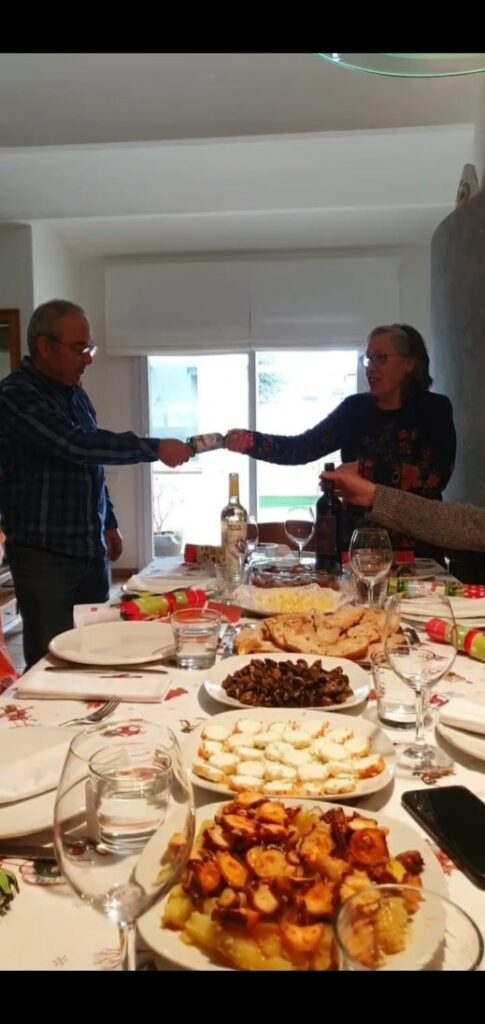
Christmas Food
Every culture has its own unique cuisine. Think of Spain and you’ll have paella spring to mind. Or think of England and maybe a Sunday Roast will pop in your head.
The typical Christmas dinner in England consists of turkey, gravy, Brussel sprouts and Yorkshire puddings. The typical Spanish Christmas dinner couldn’t be more different.
We started off with a wide range of homemade tapas for starters, such as (‘navajas’ razor fish, ‘pulpo a la gallega’ octopus on discs of potato, sprinkled with paprika, and ‘escalivada’ roasted aubergine, peppers and anchovies).
Then, the main course which was Salsa de Navidad (Christmas sauce) which consists of large chunks of cod with a tortilla made from flour and egg, in a cheesy garlic sauce.
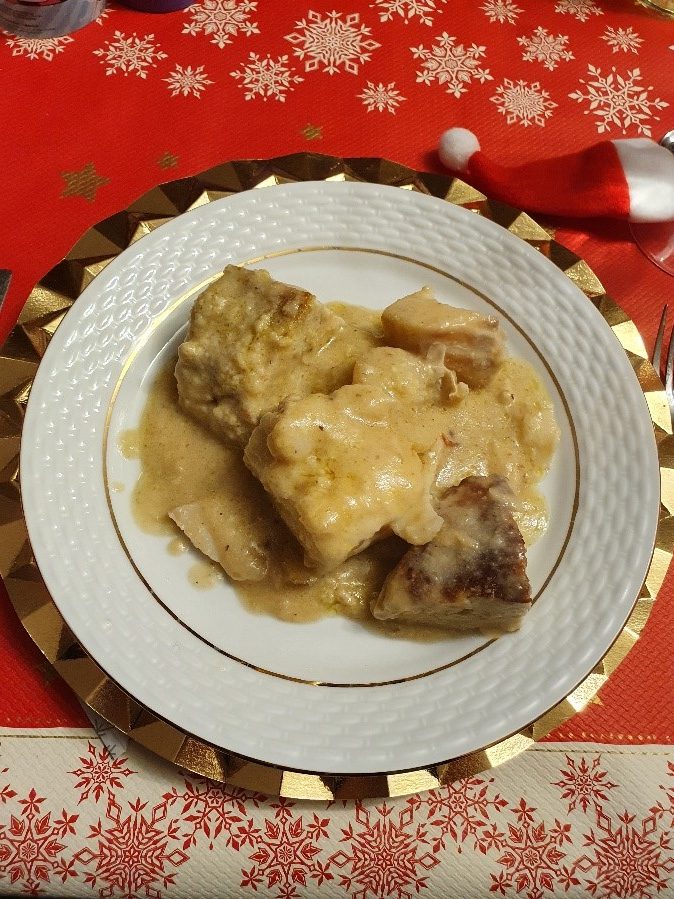
Plus, there is the typical Sopa de Navidad (Christmas Soup) which is a broth with meatballs and large pieces of shell-shaped pasta called ‘galets’ – especially popular in Catalonia.
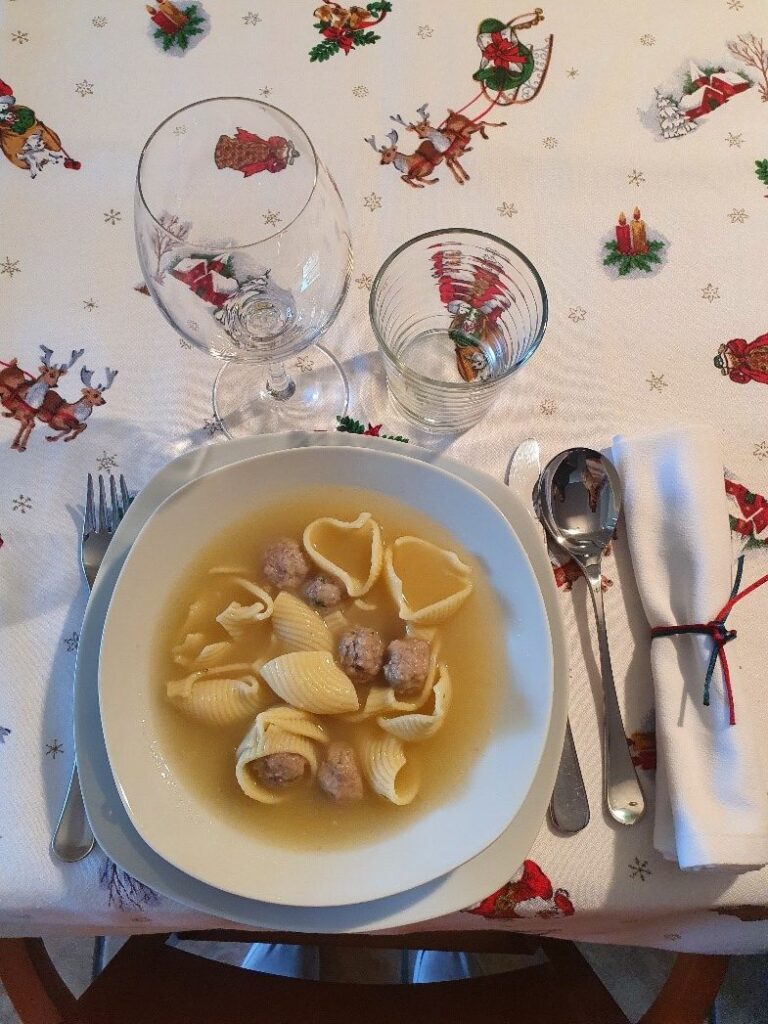
Christmas Spanish Desserts!
Let’s not forget about puddings too! I received a parcel from my family with some typical English Christmas desserts, including a Christmas pudding to share.
My host family and I set the pudding on fire and the children were amazed. It was a magical experience seeing their eyes light up as blue flame danced upon the pudding.
Spain also has its fair share of Christmas desserts, namely ‘turrones’. They are a type of nougat, traditionally made in two varieties: Jijona (soft nougat with sugar and crushed almonds), and Alicante (hard nougat with whole almonds).
Nowadays, there is a vast range of adaptations of the traditional treat. For instance, chocolate and hazelnut, ratafia (a cherry flavoured liquor), or even yoghurt and pistachio!
There are enough flavours to suit everyone. And if turrones don’t tickle your fancy, you can try some polvorones (a sweet powdery biscuit with an almond taste), or neules (vanilla flavoured water sticks). One thing is for sure, wherever you are, you will not go hungry over the festive season!
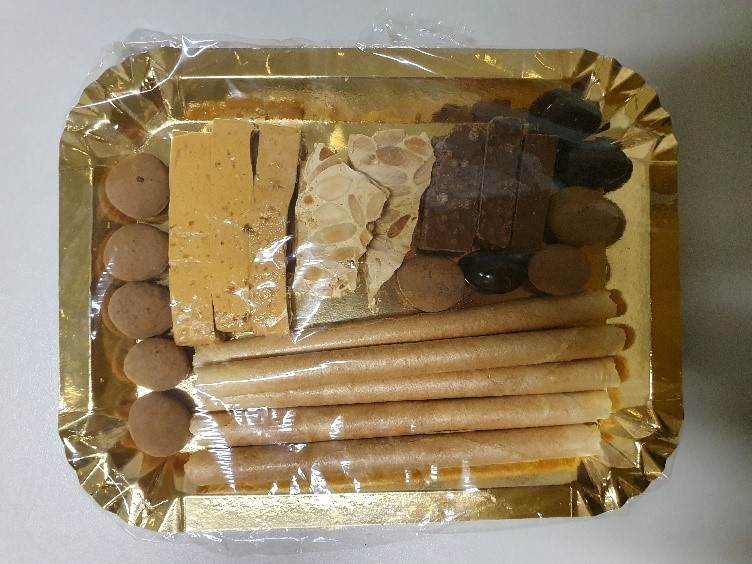
6th January – Three Wise Kings Day
Unlike in England, Christmas celebrations don’t stop in December. When you’re in Christmas in Spain, everyone looks forward to the 6th of January. This is the day when the “Tres Reyes Magos” (Three Wise Kings) bring gifts to the children.
The night before, we went to the town hall to wave to the three Kings in anticipation of their visit overnight. Then, when we returned home, we left them each a plate of food and a glass of wine, similar to Christmas Eve for Santa Claus.
In the evening, at 9.30 pm, all the children of the village simultaneously threw confetti from their windows as a sign to the kings that they should visit. The next day, the children woke up very early and were over the moon that the Kings had visited, leaving them a heap of beautifully wrapped up presents.
The rest of the day was celebrated with visits from family members and sharing a homemade roscón (a sweet, brioche-style cake). It was another unforgettable day and a wonderful end to the Christmas in Spain holidays.
Magical Spanish Culture
Christmas is always a magical time wherever you are in the world. No matter your age. One thing is certain: Spanish people have such an enriched culture with many different traditions! They make sure that the festive season is really celebrated to its full extent. It was a fascinating experience to witness Christmas in Spain first-hand and to share the British traditions that I know and love too.


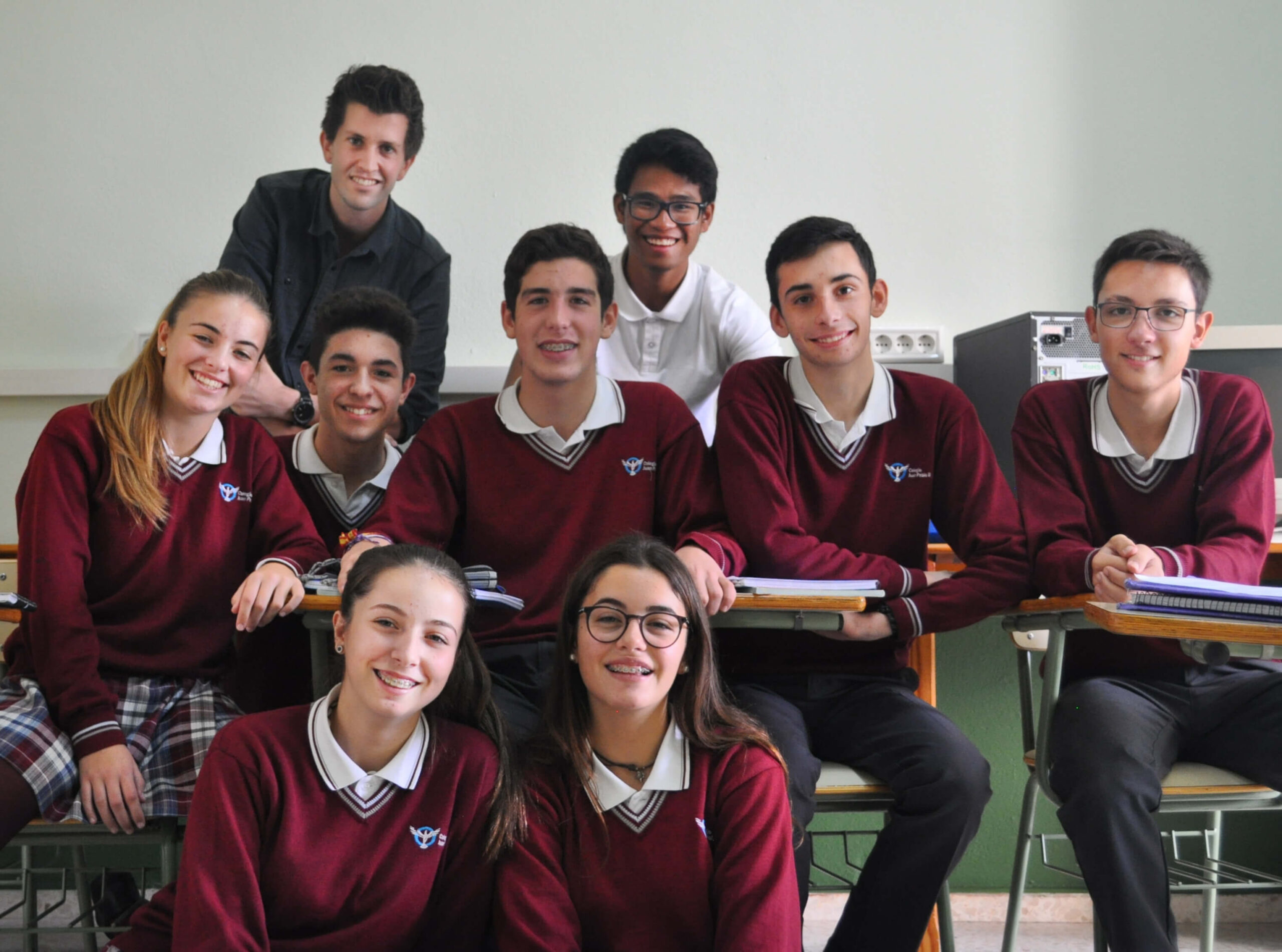

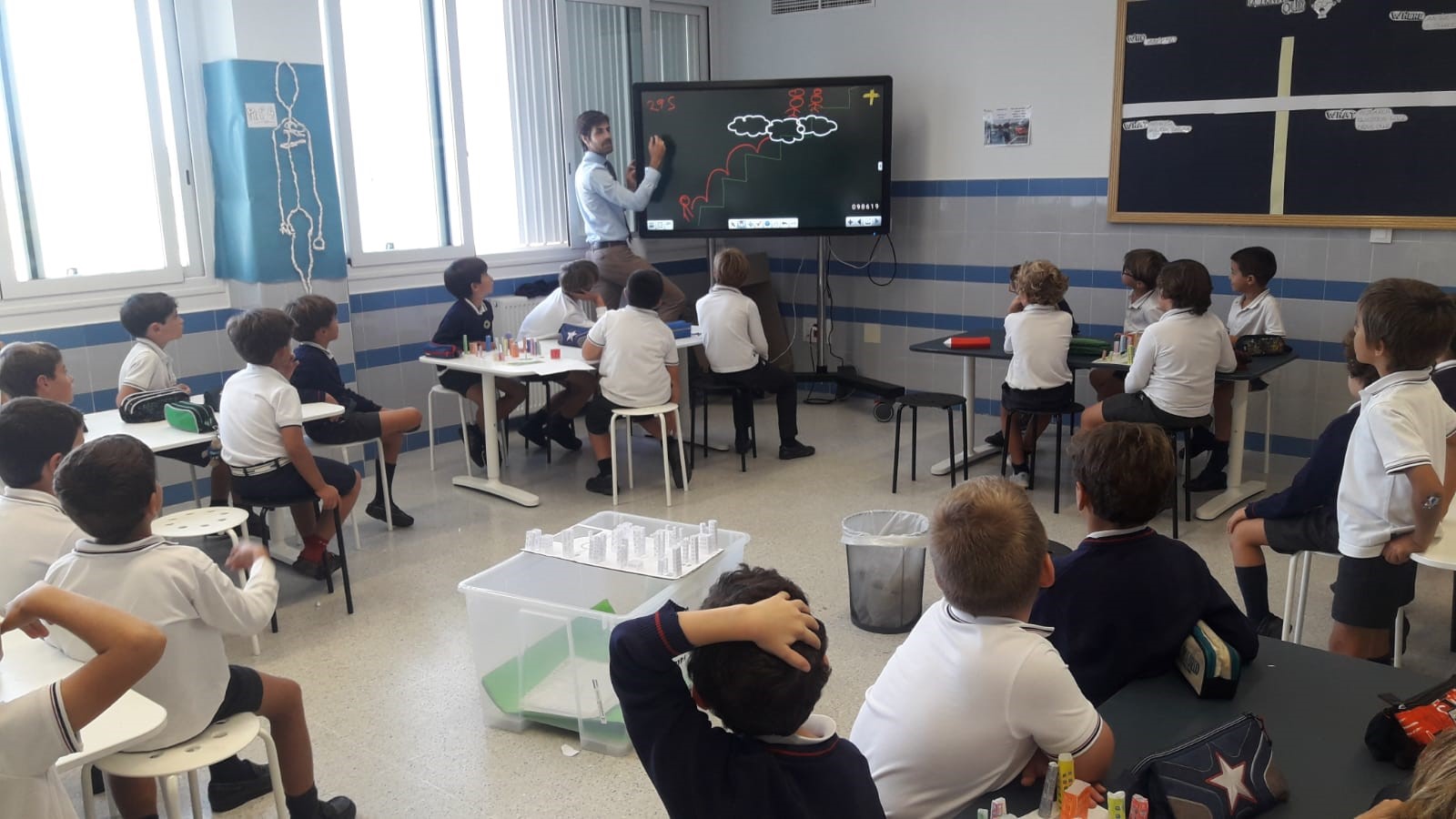






3 Responses
Oooh Emma! No lo podría haber expuesto mejor! Gracias!!
That was a brilliant piece of writing. So lovely to hear how the spanish celebrate christmas time. Love the sound of their food eaten too….beats our turkey lol x
Una exposició excel·lent de les tradicions catalanes. Moltes gràcies Emma.